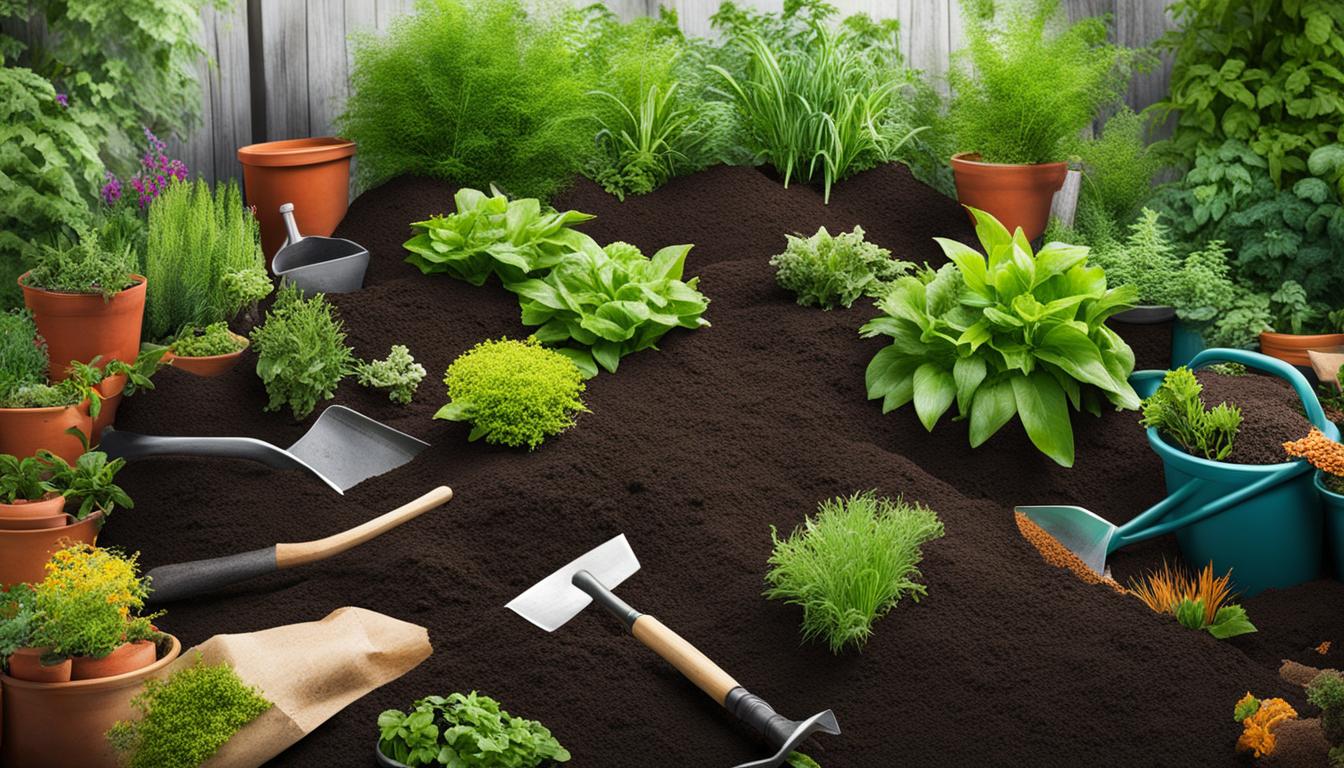
Organic gardening is all about nurturing your plants and the soil they grow in, without the use of synthetic fertilizers or harsh chemicals. One of the key aspects of successful organic gardening is choosing the right soil amendments to improve the quality of your soil.
Soil amendments are natural materials that help provide nutrients, improve soil structure, retain moisture, promote healthy plant growth, and reduce plant diseases. With the right amendments, you can create an optimal environment for your plants to thrive and produce a bountiful harvest.
Key Takeaways:
- Soil amendments are essential for organic gardening as they provide nutrients, improve soil structure, and promote healthy plant growth.
- Choosing the right soil amendments depends on factors such as soil test results, specific plant requirements, and environmental considerations.
- Compost, animal manures, chopped leaves, and plant-based amendments are popular choices for organic gardeners.
- Compost is a versatile amendment that can be made at home or purchased to enhance soil fertility and water retention.
- Animal manures, such as cow manure and chicken manure, provide a balanced supply of nutrients for plants.
Why add soil amendments to your garden?
Soil amendments offer numerous benefits for gardeners. They play a crucial role in increasing soil organic matter, which is essential for nutrient availability and overall soil health.
By adding amendments to your garden soil, you can support the soil food web, a complex network of microorganisms that contribute to nutrient cycling and plant health. These amendments also improve moisture holding capacity, ensuring that your plants receive adequate water.
Also, soil amendments help improve soil texture and structure, enhancing root penetration and drainage. They also aid in soil aeration, allowing roots to breathe and preventing waterlogging. These improvements in soil quality promote healthy plant growth and reduce the risk of plant diseases.
By incorporating soil amendments into your gardening practices, you can create an environment that is optimal for plant growth.
Whether you are growing flowers, vegetables, or herbs, the addition of amendments such as compost, animal manures, and other organic materials can provide the necessary nutrients and conditions for your plants to thrive.
The benefits of soil amendments extend beyond plant health and productivity. They also contribute to sustainable gardening practices by improving soil quality, reducing the need for synthetic fertilizers, and minimizing the impact on the environment.
When used in conjunction with other sustainable techniques like crop rotation and natural pest control, soil amendments can help create a harmonious and balanced garden ecosystem.
To summarize, adding soil amendments to your garden offers the following benefits:
- Increases soil organic matter, improving nutrient availability and soil health.
- Supports the soil food web, which aids in nutrient cycling and plant health.
- Improves moisture holding capacity, ensuring plants receive adequate water.
- Enhances soil texture and structure, promoting root penetration and drainage.
- Aids in soil aeration, preventing waterlogging and allowing roots to breathe.
- Promotes healthy plant growth and reduces the risk of plant diseases.
Why add soil amendments to your garden?
Soil amendments offer numerous benefits for gardeners. They play a crucial role in increasing soil organic matter, which is essential for nutrient availability and overall soil health.
By adding amendments to your garden soil, you can support the soil food web, a complex network of microorganisms that contribute to nutrient cycling and plant health. These amendments also improve moisture holding capacity, ensuring that your plants receive adequate water.
Soil amendments help improve soil texture and structure, enhancing root penetration and drainage. They also aid in soil aeration, allowing roots to breathe and preventing waterlogging. These improvements in soil quality promote healthy plant growth and reduce the risk of plant diseases.
By incorporating soil amendments into your gardening practices, you can create an environment that is optimal for plant growth. Whether you are growing flowers, vegetables, or herbs, the addition of amendments such as compost, animal manures, and other organic materials can provide the necessary nutrients and conditions for your plants to thrive.
The benefits of soil amendments extend beyond plant health and productivity. They also contribute to sustainable gardening practices by improving soil quality, reducing the need for synthetic fertilizers, and minimizing the impact on the environment.
When used in conjunction with other sustainable techniques like crop rotation and natural pest control, soil amendments can help create a harmonious and balanced garden ecosystem.
To summarize, adding soil amendments to your garden offers the following benefits:
- Increases soil organic matter, improving nutrient availability and soil health.
- Supports the soil food web, which aids in nutrient cycling and plant health.
- Improves moisture holding capacity, ensuring plants receive adequate water.
- Enhances soil texture and structure, promoting root penetration and drainage.
- Aids in soil aeration, preventing waterlogging and allowing roots to breathe.
- Promotes healthy plant growth and reduces the risk of plant diseases.
Choosing the Right Garden Soil Amendments
To ensure the success of your organic gardening endeavors, it is crucial to choose the right garden soil amendments. One of the first steps is to conduct a soil test, which provides valuable information about the pH level, nutrient deficiencies, and overall soil health.
Armed with this knowledge, you can select the most appropriate amendments to address specific soil needs and meet the requirements of your plants.
For example, if your soil is lacking nitrogen, you can choose from a variety of nitrogen-rich amendments such as compost, cow manure, or vermicompost. These amendments will provide the necessary nutrients to support healthy plant growth and address any nitrogen deficiencies.
If improving soil structure and moisture retention is your goal, then options like leaf mold and peat moss can be highly beneficial. These amendments help enhance soil texture and structure, as well as increase the soil’s water-holding capacity.
By incorporating them into your garden soil, you can create a favorable environment for root growth and ensure proper moisture levels for your plants.
Choosing the right garden soil amendments:
| Soil Amendment | Benefits |
|---|---|
| Compost | Improves soil fertility, enhances nutrient availability |
| Cow Manure | Rich in nutrients, improves soil structure |
| Leaf Mold | Enhances soil structure, increases water-holding capacity |
| Peat Moss | Improves soil texture, enhances moisture retention |
| Vermicompost | Supplies nutrients, enhances soil fertility |
Remember to consider the specific needs of your plants and match them with the appropriate amendments. By choosing the right garden soil amendments, you can create an optimal growing environment for your plants, leading to healthier, more productive gardens.
Compost – the Versatile Soil Amendment
Compost is a highly versatile and effective soil amendment for organic gardening. It can be made at home using kitchen scraps, yard waste, and other organic materials, or purchased from a garden center. Compost offers numerous benefits for soil enhancement and plant growth, making it an essential component for any organic garden.
One of the key advantages of compost is its ability to improve both clay and sandy soils. For clay soils, compost helps to break up the heavy texture, allowing for better drainage and root penetration.
In sandy soils, compost helps to retain moisture and nutrients, preventing them from leaching out too quickly. By adding compost to your garden soil, you can create a well-balanced growing medium that supports healthy plant growth.
Compost is also an excellent source of nutrients for plants. It contains a wide range of essential elements, such as nitrogen, phosphorus, and potassium, as well as micronutrients.
These nutrients are released slowly over time, providing a steady and balanced supply for your plants. Additionally, compost adds organic matter to the soil, which improves its structure and promotes the growth of beneficial microorganisms.
Table: Comparing Homemade and Purchased Compost
| Aspect | Homemade Compost | Purchased Compost |
|---|---|---|
| Nutrient Content | Varies depending on the ingredients | Consistent nutrient profile |
| Certifications | N/A | May be certified organic |
| Cost | Low cost or free | May be higher cost |
| Control over Ingredients | Complete control over ingredient selection | Less control over ingredient selection |
| Availability | Dependent on making and managing your own compost pile | Readily available at garden centers |
| Long-Term Sustainability | Reduces waste and promotes recycling | Reduces waste if sourced from sustainable operations |
In terms of sourcing compost, there are benefits to both homemade and purchased options. Homemade compost allows you to have complete control over the ingredients and ensures that you are using organic materials.
It can also be a cost-effective solution, as you can make it from kitchen and yard waste. However, homemade compost may vary in nutrient content depending on the ingredients used.
Purchased compost, on the other hand, offers a consistent nutrient profile and may be certified organic, providing assurance of its quality. It is readily available at garden centers, making it convenient for gardeners.
But, it may come at a higher cost compared to homemade compost, and there may be less control over the ingredient selection.
Regardless of whether you choose homemade or purchased compost, incorporating this versatile soil amendment into your garden will enhance soil fertility, improve plant health, and contribute to the overall success of your organic gardening endeavors.
Animal manures – nutrient-rich amendments
When it comes to organic gardening, animal manures are valuable soil amendments that can provide a balanced supply of nutrients for plants.
Common types of animal manures include cow, sheep, horse, chicken, and rabbit manure. These manures contribute organic matter and a variety of nutrients to the soil, promoting healthy plant growth.
However, it’s important to consider the herbicide and pesticide practices of the source when using bulk manure. This is to avoid any potential contamination that may affect the health of your plants.
It is recommended to steer clear of fresh or partially composted manure, as they can burn plants and introduce pathogens. Instead, opt for bagged manure, which is usually sterilized and free from weed seeds.
To emphasize the importance of selecting the right manure, let’s take a closer look at the nutrient content and benefits of different types of animal manures:
| Manure Type | Nutrient Content | Benefits |
|---|---|---|
| Cow Manure | Rich in nitrogen, phosphorus, and potassium | Improves soil fertility and nutrient availability |
| Sheep Manure | High in organic matter and nitrogen | Enhances soil structure and promotes healthy root development |
| Horse Manure | Rich in organic matter and nutrients | Enhances soil moisture retention and encourages beneficial soil microbes |
| Chicken Manure | High in nitrogen, phosphorus, and potassium | Boosts plant growth and improves soil structure |
| Rabbit Manure | Contains a balanced mix of essential nutrients | Provides slow-release fertilizer and improves soil texture |
By incorporating the appropriate animal manure into your organic gardening practices, you can enrich your soil with essential nutrients and promote the overall health of your plants.
Chopped Leaves and Leaf Mold – Natural Soil Enhancers
Chopped leaves and leaf mold are excellent natural soil enhancers that can greatly improve the quality of your garden soil.
Chopped leaves can be dug into garden beds in the autumn or allowed to rot down into leaf mold, which is a valuable soil amendment. Leaf mold improves soil structure, increases water holding capacity, and adds humus to the soil, creating a nutrient-rich environment for plants to thrive.
One way to make leaf mold is by shredding leaves and creating a compost bin or pile. Shredded leaves break down quicker and can be incorporated into the soil after a few weeks. Another way to utilize leaf mold is by using it as a mulch around plants. This helps suppress weeds, retain moisture, and nourish the soil over time.
By incorporating chopped leaves and leaf mold into your garden, you can improve soil structure and water holding capacity, creating a favorable environment for healthy plant growth. These natural soil enhancers are environmentally friendly and sustainable options for organic gardening.
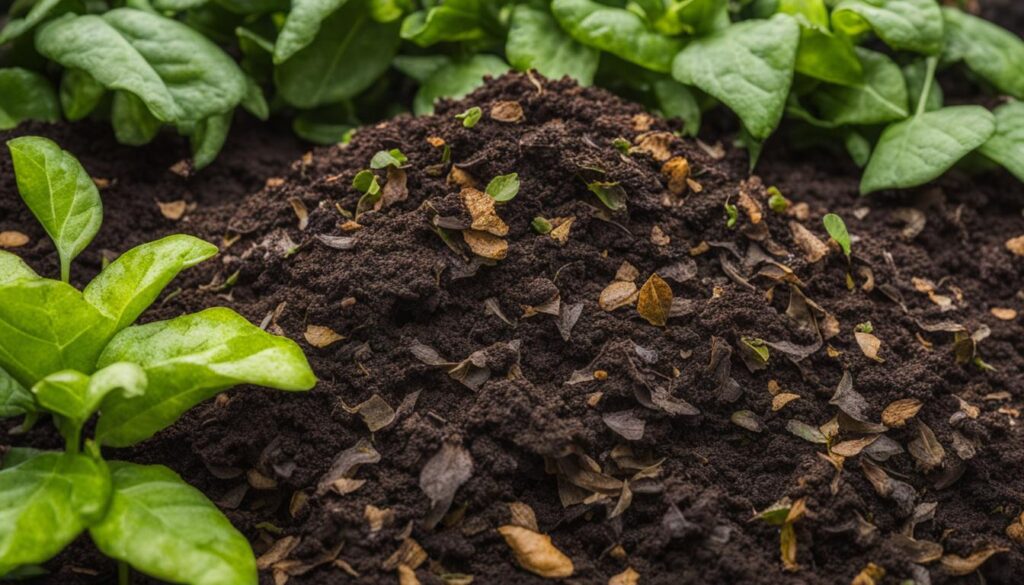
| Benefits of Chopped Leaves and Leaf Mold | How to Use Chopped Leaves and Leaf Mold |
|---|---|
|
|
Peat Moss – A Controversial Amendment
Peat moss is a popular soil conditioner used in gardening to improve soil texture and structure. Derived from dried sphagnum moss, it has long been favored for its ability to enhance water retention and promote healthy plant growth. However, peat moss is a controversial amendment due to its impact on the environment.
Peat bogs, where peat moss is harvested, are biodiverse habitats that support unique plant and animal species. These bogs take centuries to form and have limited regeneration capabilities.
The extraction of peat moss disrupts these delicate ecosystems, leading to irreversible damage. Additionally, the use of peat moss can contribute to soil acidity over time, which may not be suitable for all plants.
Considering the ecological concerns associated with peat moss, it is important for gardeners to explore alternative soil amendments that offer similar benefits.
There are numerous sustainable alternatives available that can improve soil quality without damaging the environment. By choosing these alternatives, gardeners can practice responsible gardening and contribute to the preservation of biodiversity.
The Impact of Peat Moss
Peat moss extraction has a profound impact on the environment, particularly on peat bogs. These bogs are home to diverse plant and animal species and play a crucial role in carbon sequestration.
When harvested, peat moss disrupts the fragile balance of these habitats, leading to habitat loss and the release of stored carbon into the atmosphere.
| Environmental Impact | Sustainability Alternatives |
|---|---|
| Disruption of biodiversity | Compost |
| Release of stored carbon | Animal manures |
Sustainable Alternatives to Peat Moss
There are several sustainable alternatives to peat moss that gardeners can use as soil amendments. Compost, made from organic waste materials, is an excellent choice for improving soil structure and fertility.
Animal manures, such as cow or chicken manure, provide valuable nutrients and can be used as an eco-friendly alternative to peat moss.
Gardeners can also consider using coconut coir, a byproduct of the coconut industry. Coir is a sustainable and renewable resource that improves water retention and soil aeration. Additionally, biochar, a highly porous carbon-rich material obtained from biomass, can enhance soil fertility and support the growth of beneficial microorganisms.
By opting for these sustainable alternatives, gardeners can promote healthy plant growth while minimizing their impact on the environment. Making informed choices about soil amendments is an essential step towards creating a more sustainable and environmentally friendly garden.
Other Plant-Based Soil Amendments
While compost and animal manures are commonly used soil amendments in organic gardening, there are several other plant-based options that can provide specific nutrients and improve soil fertility.
These amendments can be used to promote strong plant growth, enhance root development, and supply essential trace minerals. Here are some popular plant-based soil amendments:
- Bat Guano: A rich source of nitrogen, phosphorus, and potassium, bat guano is an excellent all-purpose fertilizer that promotes healthy plant growth.
- Blood Meal: Made from dried animal blood, blood meal is rich in nitrogen and can help boost foliage growth and enhance the overall health of plants.
- Feather Meal: Derived from ground poultry feathers, feather meal is a slow-release fertilizer that provides a gradual supply of nitrogen to plants.
- Bone Meal: Made from ground animal bones, bone meal is a good source of phosphorus and calcium, which are essential for root development and flowering.
- Soybean Meal: Soybean meal is a byproduct of soybean oil production and is rich in nitrogen, making it an excellent fertilizer for promoting vigorous plant growth.
- Alfalfa Meal: Derived from dried alfalfa plants, alfalfa meal is a natural source of nitrogen, phosphorus, potassium, and various other trace minerals.
- Neem Cake: Neem cake is a byproduct of neem oil extraction and is known for its pest-repellent properties. It also adds nutrients to the soil, promoting healthy plant growth.
- Kelp Meal: Made from dried seaweed, kelp meal is rich in trace minerals and growth-promoting hormones, making it an excellent choice for organic gardening.
- Fish Meal: Fish meal is a nutrient-rich amendment made from ground-up fish parts. It provides a balanced supply of nitrogen, phosphorus, and potassium, as well as essential trace minerals.
Each of these plant-based soil amendments has its own recommended application rate and method, so it’s important to follow the instructions provided. By incorporating these amendments into your organic gardening practices, you can provide your plants with the nutrients they need for optimal growth and development.
Incorporating the right soil amendments into organic gardening is key to creating a thriving garden that yields bountiful harvests. By improving soil quality and providing essential nutrients, soil amendments play a vital role in promoting the overall health of your plants.
From compost and animal manures to chopped leaves and plant-based amendments, there are a variety of options to choose from. By carefully selecting the appropriate amendments, you can sustainably improve the structure, texture, and nutrient content of your soil.
Remember, a sustainable approach to gardening is important for the long-term health of both your plants and the environment. By following organic practices and using environmentally friendly amendments, you can grow a beautiful garden while minimizing your ecological impact.
FAQ
What are the best soil amendments for organic gardening?
The best soil amendments for organic gardening include compost, animal manures, chopped leaves, peat moss, and various plant-based amendments like bat guano, blood meal, feather meal, bone meal, soybean meal, alfalfa meal, neem cake, kelp meal, and fish meal.
Why add soil amendments to your garden?
Soil amendments offer numerous benefits such as increasing soil organic matter, supporting the soil food web, improving moisture holding capacity, enhancing soil texture and structure, promoting healthy plant growth, and reducing plant diseases.
How do I choose the right garden soil amendments?
Start by conducting a soil test to determine pH levels, nutrient deficiencies, and overall soil health. Based on the results, select amendments that address specific needs, such as compost, cow manure, leaf mold, peat moss, or vermicompost.
What makes compost a versatile soil amendment?
Compost is a versatile soil amendment because it improves clay and sandy soils, enhances water holding capacity, promotes plant growth, and can be used as a mulch to provide a steady supply of nutrients and enhance soil health.
Are animal manures good for organic gardening?
Yes, animal manures like cow, sheep, horse, chicken, and rabbit manure are nutrient-rich and provide a balanced supply of nutrients for plants. However, it’s important to consider the herbicide and pesticide practices of the source to avoid any potential contamination.
How can chopped leaves and leaf mold enhance the soil?
Chopped leaves can be dug into garden beds or allowed to rot down into leaf mold. Leaf mold improves soil structure, increases water holding capacity, and adds humus to the soil. It can also be used as a mulch to suppress weeds and nourish the soil.
Is peat moss a recommended soil amendment?
Peat moss is a controversial amendment due to its impact on the environment. It improves soil texture and structure but is harvested from peat bogs, which are biodiverse habitats that take a long time to regenerate. Peat moss can also contribute to soil acidity, so gardeners should consider alternative amendments with fewer ecological concerns.
What are some other plant-based soil amendments for organic gardening?
Other plant-based soil amendments include bat guano, blood meal, feather meal, bone meal, soybean meal, alfalfa meal, neem cake, kelp meal, and fish meal. These amendments provide specific nutrients and improve soil fertility for strong plant growth and root development.
How can incorporating soil amendments benefit my organic garden?
Incorporating the right soil amendments can greatly enhance soil quality, promote healthy plant growth, and reduce the risk of plant diseases. It helps create a thriving and sustainable garden that yields bountiful harvests.


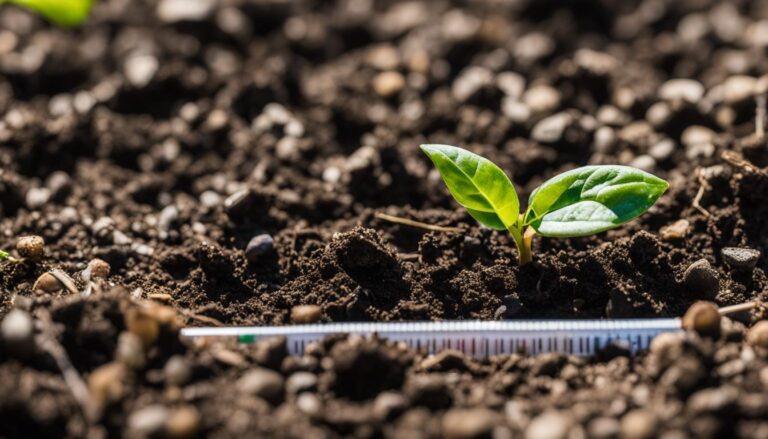
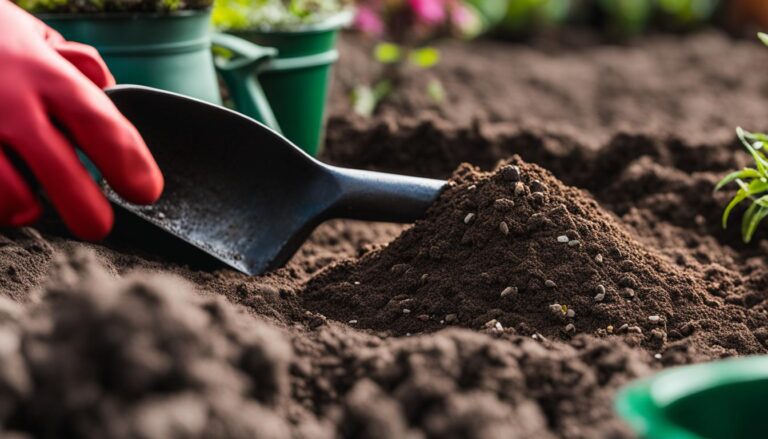
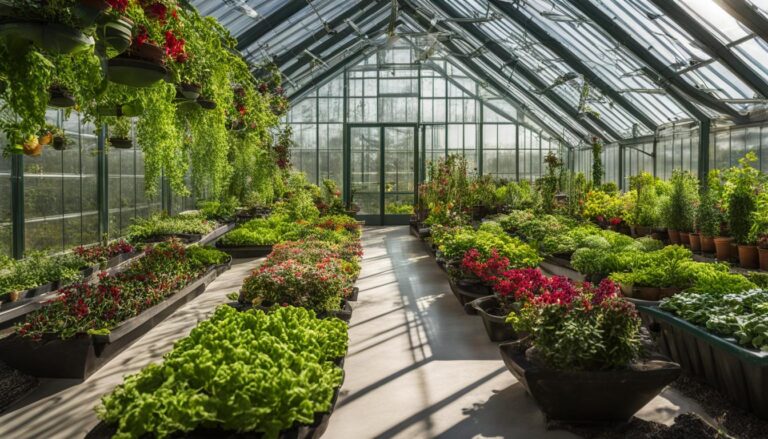
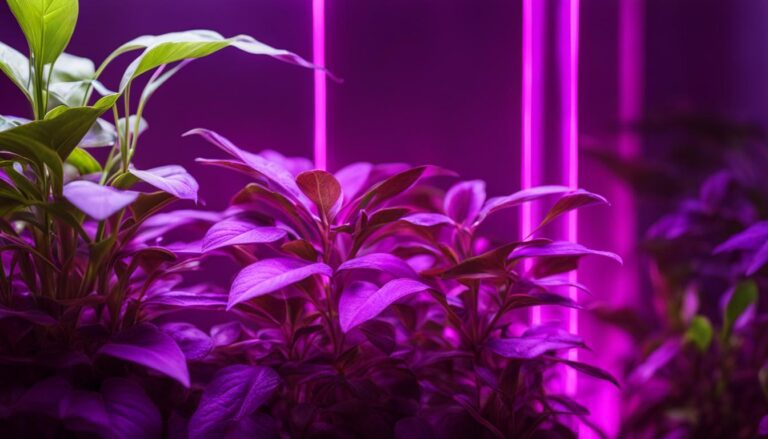

One Comment
Comments are closed.